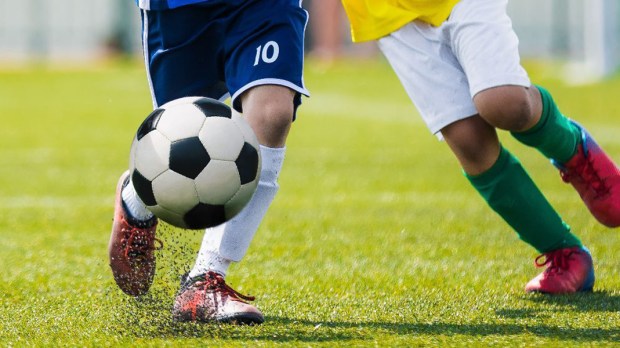In our house, fall sports season is underway. Sienna, my 8th grader, is in her second year of JH Volleyball. Charlotte, my 5th grader, is playing volleyball for the first time. As they settle into the familiar routine of practices, games, and frantic searches for kneepads, I’m settling back into my own familiar routine on the sidelines: being silent.
Okay, not totally silent. I cheer for them when they serve and return volleys, and say, “That’s okay, shake it off” when they miss one. I shout general encouragement to the team as a whole. Other than that, I keep my mouth shut.
If your kids play sports, or you played sports as a kid, or you’ve ever been to youth sports game–heck, even if you’ve ever seen The Mighty Ducks, you know that this puts me in the minority of parents. Most grade school volleyball, soccer, and basketball games echo with the shouts of parents coaching from the stands, totally invested in their children’s performance.
I get it. I’ve been there — in fact, I wrote an article a few years ago on the moment I realized that sideline-coaching was doing more harm than good. My conviction that parents need to stick to parenting and let the coaches do their job hasn’t wavered since then. The more sports my kids have participated in, the stronger that conviction becomes. But I’ve started to become aware of the subtle power of parental peer pressure at these after-school games.
Peer pressure doesn’t just disappear once you turn 30, y’all. It’s pervasive. In my experience, peer pressure among groups of parents is usually a manifestation of our desire to show that we’re invested, involved, good parents. The definition of what makes a good parent can differ wildly from group to group. Often it differs wildly from parent to parent in the same group. But when it comes to sports, there seems to be a consensus: good parents should also be good coaches, understanding both the sport and their child in the sport enough to troubleshoot. Out loud.
My 9-year-old son Liam played indoor soccer over the summer, and I loved watching him play. He wasn’t very good, and he clearly didn’t have a solid grasp of the game, but he ran around the field with this goofy-happy smile on his face the whole time. He loved playing soccer, and I loved watching him enjoy the game.
I don’t know the first thing about soccer, though I slowly became aware of just how much the parents around me understood it. Not just the basic rules, but strategy — they shouted out tips and tricks and used soccer terms I had to google later. It made me feel kind of dumb, and for the first time in years I felt the urge to shout out my own instructions. Not to actually instruct, mind you. To fit in. To prove that I, too was a savvy soccer mom.
Here’s the thing: I am not a savvy soccer mom. So I stayed in my lane and contented myself with watching. As I watched, I saw many a child’s heads turn like a swivel at the sound of their parents’ voice. No matter what was happening, when kids on the playing field heard their parents, they immediately lost focus on the game.
Our kids are attuned to us. They want to please us and make us proud. They don’t want to disappoint us. The strength of the parent-child bond is so strong that it can pull a kid right out of the intense state of focus that team sports foster. It can distract them at a critical juncture. It can also drive them to extraordinary feats — but that drive isn’t coming from the competition itself. It’s coming from the desire to please — or worse, the fear of disappointing — a parent.
I don’t like sitting on the sidelines like a lump on a log. It makes me feel disengaged, and I get self-conscious that other parents are judging me. But when I watch my daughter get drawn into an intense play, or my son run around the field with a goofy grin, I know it’s worth it. My silence is a gift to my kids. I’m giving them the gift of hearing only one coach, of having only one voice to focus on and only one instruction at a time to implement. I’m giving them the unadulterated experience of playing the game for is own sake, not for mine.
So my fellow parents, I encourage you to do the same. It might feel awkward at first, especially if you’ve always been a savvy sports mom (or dad). But just try it. For one game, resist the temptation to instruct, coach, or correct from the stands. Resist the temptation to join in with the other parents, either out of habit or peer pressure.
Just watch. Watch your kid, watch the other kids — then afterward, ask your child if they noticed a difference. Ask them how they feel about you being silent instead of vocal. I don’t know what their answer will be, but I know my kids appreciate me showing up as their mom, and leaving the coaching up to the actual coach. Because that’s the way it should be.

Read more:
8 Top sports for Catholics to play

Read more:
12 Important things your child can learn from playing sports

